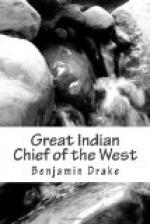“I have listened to the talk of our great Father. It is true we pledged our honor with those of our young braves, for the liberation of our friends. We thought much of it—our councils were long—their wives and children were in our thoughts—when we talked of them our hearts were full. Their wives and children came to see us, which made us feel like women; but we were men. The words which we sent to our great Father were good: he spoke like the father of children. The Great Spirit made his heart big in council. We receive our brothers in friendship—our hearts are good towards them. They once listened to bad counsel; now their ears are closed: I give my hand to them; when they shake it, they shake the hands of all. I will shake hands with them, and then I am done.”
Major Garland rose a second time, and stated, that he wished it to be distinctly understood by all persons present, in the council, that their great Father, the President, would hereafter receive and acknowledge Keokuk, as the principal chief of the Sac and Fox nation; that he wished and expected Black Hawk to listen and conform to his counsels; if any unkind feeling now existed, it must that day be buried, and, that the band of Black Hawk must be henceforth merged in that of Keokuk. The interpreter so reported the remarks of Major Garland, that Black Hawk understood the President to say that he must conform to the counsels of Keokuk; and, the old chief, losing all command of his feelings, became deeply and instantly excited. The spirit which had sustained him in earlier and better days, burst forth with uncontrollable violence. He sprung upon his feet, but so deeply excited as to be almost unable to utter a word. With the most indignant expression of countenance, and with a vehemence of manner characteristic of the savage when roused to action, he exclaimed,
“I am a man—an old man—I will not conform to the counsels of any one. I will act for myself—no one shall govern me. I am old—my hair is gray—I once gave counsels to my young men—Am I to conform to others? I shall soon go to the Great Spirit, when I shall be at rest. What I said to our great Father at Washington, I say again—I will always listen to him. I am done.”
The speech of Black Hawk—the last struggle of a fallen chieftain, caused a momentary excitement throughout the council. When it had subsided, the interpreter was directed to explain to him, that the President had only requested him to listen to the counsels of Keokuk. He made no reply, but drawing his blanket around him, sat in moody silence. Keokuk approached him, and in a low but kind tone of voice said, “Why do you speak so before the white men? I will speak for you; you trembled—you did not mean what you said.” Black Hawk gloomily assented, when Keokuk arose and remarked to the council,
“Our brother who has again come to us, has spoken, but he spoke in wrath—his tongue was forked—he spoke not like a man, a Sac. He knew his words were bad: he trembled like the oak whose roots have been wasted away by many rains. He is old—what he said let us forget. He says he did not mean it—he wishes it forgotten. I have spoken for him. What I have said are his own words—not mine. Let us say he spoke in council to-day—that his words were good. I have spoken.”




